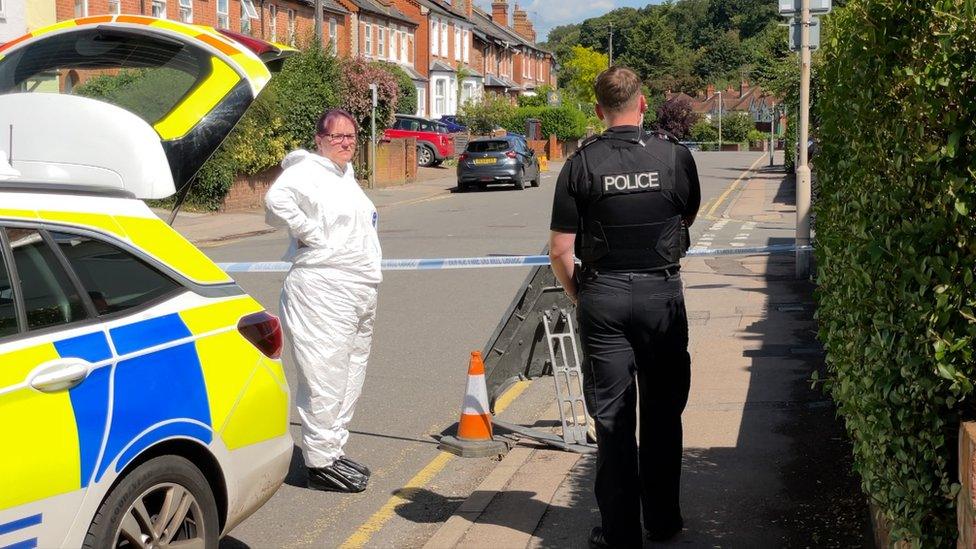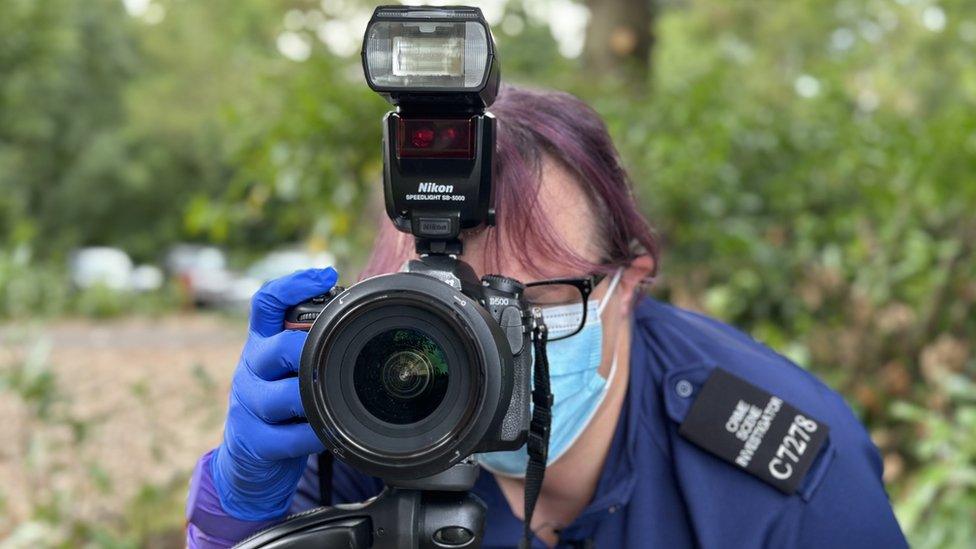Thames Valley CSI says the career is 'great for women'
- Published

Sarah Bradley was inspired by TV dramas and true crime documentaries
A scenes of crime investigator has been reflecting on the emotional toll of some of the crimes she's worked on.
Sarah Bradley, from Thames Valley Police, believes it is a great career for women who, in this area of science, make up the majority of the workforce.
Speaking ahead of a CSI recruitment day, she says she wanted to go into the career since she was a teenager.
But, having been deployed to some of Berkshire's most horrific crimes, she said it can be harrowing at times.
Ms Bradley, who has been a crime scene investigator for 21 years, said she had been inspired by TV dramas and true crime documentaries.
She said: "Some of the actual techniques they use, are what we use. So, using fingerprint powders and swabbing and things like that.
"But obviously, it takes longer to process evidence than 45 minutes to an hour."

Ms Bradley has been an investigator for 21 years and now works on major crimes
Like most CSIs, Ms Bradley started learning her craft on more minor crimes, like burglaries and car thefts.
"I still like going to burglaries," the 47-year-old said. "I still like finding fingerprints.
"I think with every CSI, it's the thing that makes you smile, when you're powdering something and you find a fingerprint.
"You do still have that excitement that it's going to be the offenders fingerprints and it's going to help the investigation."
Ms Bradley now works on serious and major crimes and witnesses very traumatic and upsetting scenes, involving both living and dead victims.
"They have had an effect unfortunately," she said. "Four years ago I was one of the CSI's that was in attendance to PC Harper's death.
"I didn't know PC Harper, personally, but he's part of the police family. So, yes, that did have traumatic results for me.
"But - with works' assistance - I've been able to work through that trauma to be able to continue doing my job."

PC Andrew Harper was dragged to his death behind a getaway car
Ms Bradley also worked on the fatal fire at Rowe Court in Reading, in which two people died, and the murder of 13-year-old Olly Stephens at Bugs Bottom near Caversham.
While the job can be distressing, Thames Valley's forensic trainer Doron Jensen said satisfaction comes from seeing the evidence they collect and process help get justice for victims and their loved ones.
"It is exciting work. It is interesting. The people who do this, do it because they enjoy it. They enjoy the variety," he said.
"It's manual work a lot of the time. It can be very methodical, very systematic. So you have to have that mindset, as an investigator."
In most areas of science, men make up the majority of the workforce. But in England and Wales, Forensic Capability Network data shows 60% of CSI's are women and 64% of fingerprint bureau staff.

Forensic Capability Network data shows 60% of crime scene investigators are women
Ms Bradley described the Thames Valley CSI team as "very female dominated".
"I have no idea why," she said, "but it is a very good career for females."
Thames Valley's six CSI teams are located across Berkshire, Buckinghamshire and Oxfordshire. They are all civilians and some have designated powers to enter, search and seize property.
They are supported by the force's laboratories which employ imaging, fingerprint, digital and trace evidence specialists among other disciplines.

Follow BBC South on Facebook, external, Twitter, external, or Instagram, external. Send your story ideas to south.newsonline@bbc.co.uk, external.
Related topics
- Published31 July 2020
